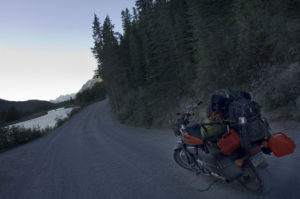This is a guest post by Alexander Tolchinsky, a biker, teacher, and writer with a wandering soul, and the second in a series of articles from the road.
 WE shout of freedom and the air that doesn’t choke, and every so often we break free and immerse ourselves in Green. But, it is not to last – like heroin fading from our veins, we begin to chafe under the lack of ever-present stimulus. Blogs, TV, Google, Lights, texting and tweeting… and the all you can eat of media vomit, and the isle after isle of choice – no need to adapt and adjust, if there is a “need,” it is filled.
WE shout of freedom and the air that doesn’t choke, and every so often we break free and immerse ourselves in Green. But, it is not to last – like heroin fading from our veins, we begin to chafe under the lack of ever-present stimulus. Blogs, TV, Google, Lights, texting and tweeting… and the all you can eat of media vomit, and the isle after isle of choice – no need to adapt and adjust, if there is a “need,” it is filled.
We need the movie, the club, the show, the clothes, the recognition, shameless flaunting of our emptiness. Because when we find ourselves too long in nature we become faced with ourselves – without the anesthesia of constant bombardment of how we should think, what we should feel, what we should buy, who is our enemy, and how we can PROJECT instead of BE – we shut down and curl up in the corner.
We are scary upon first encounter. We discover our emptiness and depravity, the hidden truth that on average we have naught to offer ourselves, let alone some one else.
So we flee the Green and the clean and the pure, and re-immerse in the muck of falsehood.
“Act as if…” has become all we are; we show what we are not because we have ceased to struggle to make ourselves real.
For us, who came at the dawn of our life, this holds more than a sad truth. We could not choose to take the privilege of this country for granted. Our facade was a necessity – almost created for us, by the self-righteousness of our adopted countrymen.
But this is not all there is to US. If only we can handle the withdrawal, fight the urge to hide, then we discover the basic truth – which is our basic good.
Few people go on a journey and come back with hatred in their hearts and a revulsion toward humanity. In fact, those of us who have ventured into the unknown more often than not discover that basic goodness shared by humans across the globe.
There is a magic about the act of journeying that brings forth this truth, both in ourselves and in those we encounter. Somehow people see the person who has surrendered to the road, see their own often repressed dreams alive in another, and open themselves and their home, allowing us to witness true humanity.
 There are moments when I doubt my ability to continue, or am faced with the uglier side of Self, but i persist and overcome these symptoms and am rewarded again and again with a renewed faith in myself and our lost and confused race.
There are moments when I doubt my ability to continue, or am faced with the uglier side of Self, but i persist and overcome these symptoms and am rewarded again and again with a renewed faith in myself and our lost and confused race.
This facing and battling of Self also infiltrates my writing. Invariably the natural doubt present in all those who attempt to speak for others, strangulates the process itself: my efforts to begin my book are curbed by a constant back and forth about whether it should be a novel or a collection of stories. This in turn brings me back to what I think should be the purpose of this book. I want “others” to know about our unique generation, and for “us” I want there to be record and a source for commiseration, because though we share many similarities, assimilation has dispersed us and our story and our shared identity.
There also comes a question of plot and character development: do I want self contained ideas and stories that relate the diversity and experience of more people and situations, or, do I want to dig deeper into a few characters and develop them over time and attempt to bring out our collective experience through them?
Aside from my book and this blog, I will be working on translating two primary Holocaust documents – a book and a dairy. My concern with approaching either is similar to the one I have about my book: representation. Because both were written (in Russian) by members of my family, I have a certain leeway as to how I translate the content and present it to the English-speaking world.
But to what end these translations? What is the impact I wish them to have? And so: do I keep it pure or add the greater context necessary for a wider public to accept them?

